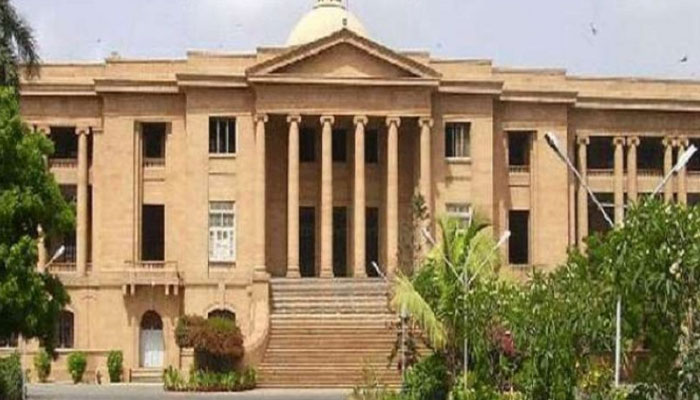SHC moved against Uzair Baloch’s conviction by military court
The family of the alleged kingpin of the Lyari gang war, Uzair Jan Baloch, has filed a petition with the Sindh High Court (SHC) challenging the conviction of Uzair by a military court over espionage charges.
The petitioner, Uzair’s mother Razia Begum, submitted in the petition that her son was picked up by personnel of law enforcement agencies in January 2016 and remained in their custody for over a year.
She submitted that Uzair was booked and chargesheeted in 40 terrorism-related cases which were pending before anti-terrorism courts (ATC). She informed the SHC that her son was shifted from the central prison on April 12, 2017, to the military authorities to face field general court martial for his alleged involvement in espionage activities and working for foreign intelligence agencies.
Razia submitted that Uzair was handed over to the Karachi prison authorities in the first week of April and it was reported by the media that he had been convicted by the military court.
She submitted that applications had been sent to the military and prisons authorities for a copy of military court proceedings; however, no copy of the judgment and other record and proceedings were provided.
The counsel for the petitioner submitted that her son was convicted without jurisdiction and cogent evidence and he had the right for a fair trial and the legal right to appeal against his conviction.
He submitted that the petitioner was not allowed to meet her son and no copy of military court proceedings and judgment were provided to her. He argued that the conviction of Uzair under the Pakistan Army Act read with the section 3 of the Official Secrets Act was illegal as the required procedure was not adopted, there was no cogent evidence and there was corum non judice.
The counsel submitted that the right of the petitioner to consult and be defended by a legal practitioner of his choice was not provided; therefore, the entire trial had been conducted in contravention of the Article 10-A of the Constitution. He submitted that not providing the conviction judgment and other proceedings of the alleged trial are complete violation of the Articles 8 and 10-A of the Constitution as the same affected the ability of the convict to defend himself properly in the trial court and the same amounted to the denial of substantive right into injustice on the touchstone of Islamic injunctions.
The high court was requested to set aside the military court conviction as being in violation of the law and direct the military authorities to produce the judgment and record of the proceedings before the court and provide their copies to the petitioner.
The petitioner also sought an injunction against the implementation of the impugned military court judgment and allow her and her counsel to meet Uzair in the prison. It is pertinent to mention here that Uzair, who was tried by a military court under the charges of espionage for Iranian intelligence agencies, had earlier confessed to his association with the Pakistan Peoples Party’s central leadership, including its women wing leader Faryal Talpur, and made startling disclosures in the joint investigation report regarding the involvement of politicians in crimes such as killings and extortion.
-
 Teyana Taylor Reveals What Lured Her Back To Music After Earning Fame In Acting Industry
Teyana Taylor Reveals What Lured Her Back To Music After Earning Fame In Acting Industry -
 Prince William Shows He's Ready To Lead The Monarchy Amid Andrew Scandal
Prince William Shows He's Ready To Lead The Monarchy Amid Andrew Scandal -
 Lux Pascal Gushes Over Role In Tom Ford's 'Cry To Heaven': 'I Just Wanted To Be Part Of This Picture'
Lux Pascal Gushes Over Role In Tom Ford's 'Cry To Heaven': 'I Just Wanted To Be Part Of This Picture' -
 Near-blind Refugee Found Dead In Buffalo After Release By US Border Patrol
Near-blind Refugee Found Dead In Buffalo After Release By US Border Patrol -
 Firm Steps In Forcing Andrew’s Hand: ‘Can No Longer Keep A Promise'
Firm Steps In Forcing Andrew’s Hand: ‘Can No Longer Keep A Promise' -
 Kenyan Man Accused Of Recruiting Men To Fight In Ukraine
Kenyan Man Accused Of Recruiting Men To Fight In Ukraine -
 'The Wrong Paris' Star Veronica Long Shares What New Crime Series 'Blue Skies' Is About
'The Wrong Paris' Star Veronica Long Shares What New Crime Series 'Blue Skies' Is About -
 King Charles Remains Immersed In Work Amid Andrew Scrutiny
King Charles Remains Immersed In Work Amid Andrew Scrutiny -
 Bobby J. Brown's Passing Adds To Growing List Of Celebrity Deaths In 2026
Bobby J. Brown's Passing Adds To Growing List Of Celebrity Deaths In 2026 -
 Prince William Fears For Andrew's Mental Health
Prince William Fears For Andrew's Mental Health -
 Paige DeSorbo Breaks Silence On New Relationship With Joe D'Amelio
Paige DeSorbo Breaks Silence On New Relationship With Joe D'Amelio -
 'Marshals' Showrunner Reveals If Kayce And Beth Will Cross Paths In 'Yellowstone' Spinoff
'Marshals' Showrunner Reveals If Kayce And Beth Will Cross Paths In 'Yellowstone' Spinoff -
 Belgium Watchdog Launches Antitrust Probe Into Google Ads Business
Belgium Watchdog Launches Antitrust Probe Into Google Ads Business -
 Andrew Ready To Fight Back: 'He's Very Vengeful'
Andrew Ready To Fight Back: 'He's Very Vengeful' -
 After Surpassing 100 Million YouTube Subscribers, BLACKPINK Returns With New Release
After Surpassing 100 Million YouTube Subscribers, BLACKPINK Returns With New Release -
 Rihanna Sends Fans Into Frenzy With BTS Footage Of Music Making: Watch
Rihanna Sends Fans Into Frenzy With BTS Footage Of Music Making: Watch




